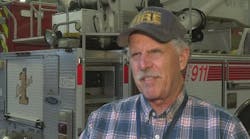Unfortunately, this did not turn out to be a routine call and it changed Tomaso's life forever. This is the call on which Tomaso believes he contracted Hepatitis C.
The Hepatitis C virus (HCV) is a growing epidemic in the United States and is a blood-borne infectious disease that is transmitted from person to person by blood or body fluid exposures. There is no known cure and there is no vaccination against Hepatitis C.
First reported in 1975, it was called non-Hepatitis A and B. It was not until 1989 that it was renamed Hepatitis C. No testing of blood products for Hepatitis C occurred until 1992. Most people who have contracted Hepatitis C did so through illegal drug use, blood transfusions, organ transplants, body piercing or tattooing, or sex with an HCV-infected person. There is also a high concentration of Hepatitis C among prisoners, HIV patients and intravenous drug users.
An estimated 4 million Americans are chronically infected and approximately 8,000 people die each year from Hepatitis C-related illnesses. The death rate is expected to triple in the next 20 years. Between 75% and 85% of people who contract Hepatitis C will develop a chronic disease, such as cancer or cirrhosis of the liver. While most of them contracted Hepatitis C through means already listed in this column, another cluster of contamination is found among public safety professionals who are exposed to blood and body fluids every day. Some of my previous columns discussed the situation with the Philadelphia Fire Department and the high incidence of firefighters and paramedics diagnosed with Hepatitis C and their efforts to have it recognized as an on-the-job injury.
Such is the case with Tomaso. Only recently, after a two-year battle and $124,000 in just prescription costs, besides all the medical costs, did the medical insurance company accept responsibility, but not liability for Tomaso's illness. As of this writing, the insurance company has not paid any of the bills.
Tomaso documented the exposure with the 83-year-old man, primarily for the living conditions and what he found so that it could be referred to a social agency. Little did he realize that the documentation would later be crucial in his worker's compensation case.
In November 2000, Tomaso suffered an on-the-job needlestick injury. As part of the procedure, baseline blood work was conducted to make sure he did not have a previous infectious disease. Although the patient involved in the needlestick incident was negative for any infectious disease, the baseline blood work did show that Tomaso had Hepatitis C.
Tomaso did not fit any of the risk profiles for contracting Hepatitis C except that he was a paramedic. The only other exposure he could recall was the 83-year-old man living in the basement. The family did confirm that the gentleman did have Hepatitis C, but refused to release his medical records.
Tomaso, who has been an emergency medical technician (EMT) since 1981 and a paramedic since 1998 in a variety of paid and volunteer positions, says the symptoms were always there - fatigue, loss of appetite and an occasional rash on his chest - but he always attributed them to a heavy call load. Never did he realize he had Hepatitis C.
For over 20 years, Tomaso fought to save lives. Now, he finds himself fighting for his own life. He is a non-responder to traditional treatment methods to hold down the viral load in his body. Hepatitis C is usually a slow-progressing disease and some people may be infected for 20 years before they find out they have the disease. But in Tomaso's case, the disease is progressing rapidly and he finds himself no longer able to work. The doctor made him stop working last Sept. 30. He now has episodes where he passes out and sometimes the pain in his stomach is more than he can bear. Medications have little if any effect on the pain.
Until he wins his fight for worker's compensation, he is receiving no income and his wife continues to financially support the family with three children. The insurance company won't cut a check to cover his worker's compensation because there is a dispute as to whether it is a New York or Connecticut worker's compensation claim. To make matters worse, his car has been repossessed, gas and telephone service were turned off in January, there is the threat of foreclosure on his home, and Christmas was not the best for his three children.
Tomaso now finds himself, as he describes it, going from "guinea pig" to "experimental lab rat." He has been accepted to the University of Connecticut's "Halt C" program and will shortly start radical treatments of daily doses of interferon to stop the disease from ravaging his body. If it does not work, he faces a liver transplant costing $250,000 and anti-rejection drugs costing approximately $100,000 per year. Even then, a transplant will not rid his body of the disease. The new liver will also eventually be attacked by the Hepatitis C that will remain in his body.
One day, Tomaso would love to go back to work. When he found out he had the disease, he came clean to his co-workers and they were very supportive. He truly enjoyed his work and has no regrets entering the profession that may eventually cost him his life. In fact, he says that if he had the chance, he would do it over. He even spent time working at ground zero searching for friends who were missing after the 9/11 attack.
Why is Tomaso going public with his disease? He does not want anybody who works in public safety to go through what he is going through. He is also working with legislators to enact a law in Connecticut that would presume that a public safety professional suffering from an infectious disease contracted it in the performance of duties, unless proven otherwise.
Tomaso's life will never be the same. Constant precautions need to be taken at home to ensure that his wife or children do not get the disease. This includes color-coded shavers for him and his wife, separate drinking glasses, etc.
Several years ago, Dr. C. Everett Koop, former U.S. Surgeon General, said of HCV, "We stand at the precipice of a grave threat to our public health. …It affects people from all walks of life, in every state, in every country. And unless we do somebody about it soon, it will kill more people than AIDS."
Tomaso's message to his fellow public safety professionals is to protect yourself and document any and all exposures. If you would like to contact Tomaso, he can be reached via e-mail at [email protected].
Gary Ludwig, MS, EMT-P, a Firehouse® contributing editor, is the chief of Special Operations for Jefferson County, MO. He retired in 2001 as the chief paramedic for the St. Louis Fire Department after serving the City of St. Louis for 25 years. He is also vice chairman of the EMS Section of the International Association of Fire Chiefs (IAFC). He is a frequent speaker at EMS and fire conferences nationally and internationally, and is on the faculty of three colleges. Ludwig has a master's degree in management and business and a bachelor's degree in business administration, and is a licensed paramedic. He also operates The Ludwig Group, a professional consulting firm. He can be reached at 636-789-5660 or via www.garyludwig.com.




